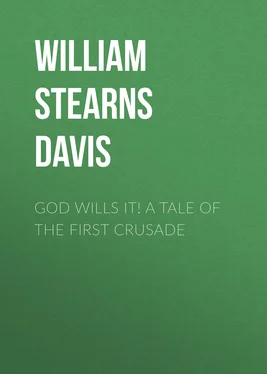William Stearns Davis - God Wills It! A Tale of the First Crusade
Здесь есть возможность читать онлайн «William Stearns Davis - God Wills It! A Tale of the First Crusade» — ознакомительный отрывок электронной книги совершенно бесплатно, а после прочтения отрывка купить полную версию. В некоторых случаях можно слушать аудио, скачать через торрент в формате fb2 и присутствует краткое содержание. Жанр: foreign_prose, foreign_antique, на английском языке. Описание произведения, (предисловие) а так же отзывы посетителей доступны на портале библиотеки ЛибКат.
- Название:God Wills It! A Tale of the First Crusade
- Автор:
- Жанр:
- Год:неизвестен
- ISBN:нет данных
- Рейтинг книги:4 / 5. Голосов: 1
-
Избранное:Добавить в избранное
- Отзывы:
-
Ваша оценка:
- 80
- 1
- 2
- 3
- 4
- 5
God Wills It! A Tale of the First Crusade: краткое содержание, описание и аннотация
Предлагаем к чтению аннотацию, описание, краткое содержание или предисловие (зависит от того, что написал сам автор книги «God Wills It! A Tale of the First Crusade»). Если вы не нашли необходимую информацию о книге — напишите в комментариях, мы постараемся отыскать её.
God Wills It! A Tale of the First Crusade — читать онлайн ознакомительный отрывок
Ниже представлен текст книги, разбитый по страницам. Система сохранения места последней прочитанной страницы, позволяет с удобством читать онлайн бесплатно книгу «God Wills It! A Tale of the First Crusade», без необходимости каждый раз заново искать на чём Вы остановились. Поставьте закладку, и сможете в любой момент перейти на страницу, на которой закончили чтение.
Интервал:
Закладка:
And Richard drank, while all the time he felt the tide of intoxication sweeping him onward. Glancing into the Greek's eyes, he knew in a half-conscious way that a like spirit possessed her too. Had they been alone, only the saints know what might have befallen. Richard's voice was very loud when he answered, "No, by the Splendor of God, you must stay at Cefalu,—you shall ride my best palfrey; fly the white falcon!" The lady cut him short with another laugh, her face still very merry: "St. Basil, make them deaf; they all look at us! What have we been doing!"
Richard started, as from a dream: father, mother, bishop, the Cæsar, were all looking upon them. The Lady Margaret was turning a warning face upon Richard, but the Cæsar addressed his daughter austerely. "My child, these noble Franks and your valiant rescuer will take away strange tales of your conduct at this feast. Believe me, kind lords, my daughter is commonly less bold and unmaidenly than to-night. This has been a strange day for us, and we must pardon her much."
"You forget the princess is not your sister," added Lady Margaret, severely, her eyes on Richard; and the Baron was ready with his own word, but the younger Greek cut all short.
"Yes, by St. Theodore," was her saucy cry, "this has been a strange day for us all. And if you, my father, think my saving is over-dear at two cups of wine, let the Berbers snatch me off again! But give no blame to my Lord Richard, for it was I that began, led on, and made the fire tenfold hotter."
Cæsar Manuel hobbled to his feet.
"I do not blame my Lord Richard," said he, curtly; "I only fear lest closer knowledge make him repent your friendship. Most gallant Baron, and you, noble lady," continued he, bowing in courtly fashion to both, "I am feeble, and my daughter has diverted you enough. With your pardon, let us go to our chambers."
The Baron muttered something to the effect that there was still much wine—a pity to miss it. Mary rose and deliberately allowed Richard to bend and kiss her hand, courtesied before the Baron and his lady, knelt while the half-tipsy bishop hiccoughed out a benediction. Stately as a queen, she drew herself up, but her last shaft was darted at the Cæsar. "Dear father, are you not sorry I am so little contrite?" then to Richard, "And you, my lord, do not forget we go to Palermo!" There was a rustle of her dress; Manuel limped after; three serving-varlets brought up the Greeks' rear. They were gone. Richard started again—looked about. His mother and sister had risen also. The Baron and the bishop had reached that stage of joviality where the holy man was commencing to sing and brandish his flagon. Richard tasted the wine—insipid; how unlike the sweet fire of the cups proffered by the lady! Musa had glided from his revery,—was casting about sharply.
"My head throbs, though I have drunk little," professed the Norman. "Do you wish more?" Musa shook his head. "Then come upon the battlements; the bishop's bellowing makes one mad."
They mounted through darkened chambers, up dizzy ladders, to the summit of the donjon. It was a murky, cloudy night that greeted them as they emerged from the trap-door and stood alone on the stone-girt platform, with the land and the sea one vague black haze below. No moon, no stars; only a red flash on the ground where the light streamed from a loophole in the great hall. No sound save the faint shouts of the drinkers, echoing from far below, and their own measured footfalls. They paced the platform for a few moments in silence. Then the Norman broke forth in Arabic:—
"Musa, son of Abdallah, we have sworn brotherhood. Our friendship is young: may I put it to a test?"
"My hands, my wits, my head if need be, all yours, my brother," replied the Spaniard, never hesitating.
"Help me to gain the hand of this lady!"
Their hands rested on one another's shoulders. Richard felt—but perchance he was wrong—a quiver run through the Moslem; only for an instant, if at all. Very naturally Musa replied:—
"Had you said, 'Kill me this enemy,' how easy to aid you! But to win the lady, what may I do? I am no magician to mix you philters. In her eyes I am only Moslem, and Infidel. She has not learned, as have you Sicilian Normans, that Christian and Moslem may be friends. I would be a sorry pursuivant in your behalf."
Richard was silent; then cried out:—
" Ai , it is all madness! I have no need to be told. I set eyes on her first this morning. Holy Mother, what sin is mine that I should be afflicted thus! Never before have I loved a maid so much as my white falcon. Yet were I longing for a drop of water in Purgatory, I could not have greater desire. It is sin; it is madness; I must never see her again, or great sorrow will come of it!"
But Musa pressed his arm closer, and more kindly.
"No," said he, softly, in his rich Spanish accent; "if it is mere fleeting passion, it will end; and the upright man is none the worse. Is it a sin to take delight, when Allah reveals to us what seems a glimmer of Paradise? And as for the future, that lies in the hands of the Most High. Whatever is written in the books of our dooms—what power may withstand? To-day, call it madness, and speak not of it. To-morrow, if it live, call it passion—speak in whispers. A month, a year; call it love—it will speak for itself. It is a fire—all men see it. And who would then hide its brightness?"
"Ah," answered the Norman, "what day is this! How dare I stand and speak thus to you of what I ought to hide even from myself? How long have I known you?"
"How long?" replied the other, dreamily. "Friendships are made in the heart of Allah. Before the earliest star was created, before He said to the earth, 'Be,' it was destined that friend should be joined to friend, and when two such souls in the body meet face to face, they are not strangers. In each other they see a fellow that they have loved, while they dwelt as thoughts in the bosom of the Eternal."
"Yes," said Richard, caught in the pensive mood of the other, "we are friends. Why? We know not. To what end? A mystery! It is well we both believe God is good."
"He is good," said Musa, reverently, and they descended.
CHAPTER IV
HOW RICHARD WENT TO PALERMO
The yawning servants had carried the bishop from under the table, long before Baron William that night found the bottom of his last flagon. Yet early the next morning, none was more nimble and jovial than he. The Greeks did not come down to the great hall; they were fatigued, said Sylvana the old servant who had adjured Richard to rescue them during the fight. The Cæsar's wound was paining him, and he required the care of his daughter. So it was noon before Richard set eyes again on the princess, as she came into the bailey with her father on her arm, to help him into his litter. The bishop was impatient to be away. What with the clamor of the foot-boys and grooms, and the neighing of impatient steeds, there was little chance for ceremonious leave-taking. The bishop had thanks and blessings for his rescuers and hosts. The Cæsar gave a few courtly phrases of gratitude; his daughter bestowed on Lady Margaret and Eleanor each a hearty kiss, and for Richard, one smile from her bright eyes, and the words, "Fail not to wait on us, if you come to Palermo." So the troop started, leaving Richard to stare after them until the cavalcade was a speck on the roadway, and for the rest of the day to resolve many times that to Palermo he would go ere many months be sped.
But in the days that followed he was not idle. First of all the bishop's gift, the great black horse, had to be wrestled into submission; no light task, for the mighty beast would rage like a bull; but in the end the brute was conquered, and "Rollo"—such was his christening—became Richard's boon comrade and second self; dear as those horses whereof the jongleurs sang, that would snatch their masters from the midst of a host of foes, or recognize them returning home after seven years, when the riders' own wives had forgotten them. But this was the least the raid of the Berbers had brought to Richard, for he and Musa became grappled to each other by bonds of friendship that tightened each day. The Spaniard had sealed his gratitude by the gift of a Valencia hauberk, inwrought with gold wire, light almost as velvet, on whose links once the sword of Cid Campeador had turned. And Musa brought also a wonderful chessboard of rock crystal with men of silver, over whose magic squares the Norman was to puzzle many an hour; but beyond all else, Musa brought himself—more a marvel every hour to Richard Longsword. What had he not learned and done! A swordsman whose prowess in the fence tested Richard's utmost skill; a poet whose musical Arabic must have charmed many a fair brunette by the darkling Guadalquiver. He could talk of elixirs, alembics, and horoscopes. The learning of the University of Cordova was his; he could read Greek and Latin, and had a smattering of the Languedoc. Only a consistent Moslem he was not,—neither going to the mosque on Fridays, nor abstaining from wine nor remembering the fasts; and when Richard asked, "Will you turn Christian?" Musa had replied, laughing, "I am of the rationalist school of the Kalif Mamun,—reason alone is the father of religion; even the commands of Al-Koran are not fetters to bind, when reason directs otherwise."
Читать дальшеИнтервал:
Закладка:
Похожие книги на «God Wills It! A Tale of the First Crusade»
Представляем Вашему вниманию похожие книги на «God Wills It! A Tale of the First Crusade» списком для выбора. Мы отобрали схожую по названию и смыслу литературу в надежде предоставить читателям больше вариантов отыскать новые, интересные, ещё непрочитанные произведения.
Обсуждение, отзывы о книге «God Wills It! A Tale of the First Crusade» и просто собственные мнения читателей. Оставьте ваши комментарии, напишите, что Вы думаете о произведении, его смысле или главных героях. Укажите что конкретно понравилось, а что нет, и почему Вы так считаете.












